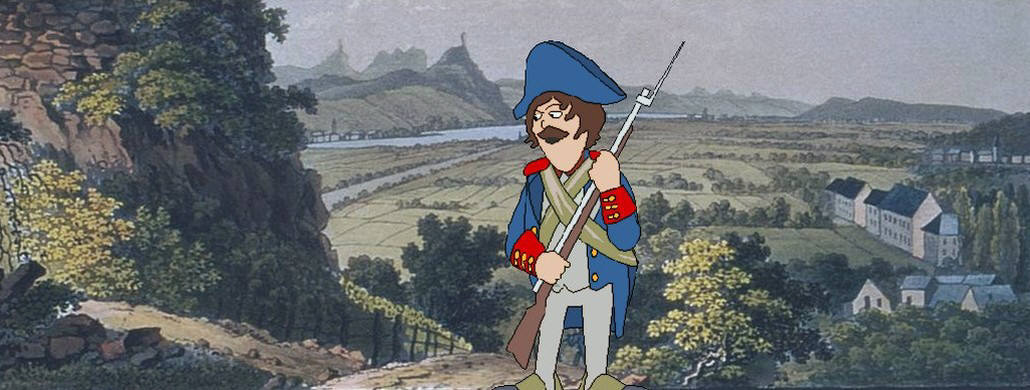
[Rhineland, 1794] While at the Potomac the new capital came into being, no stone remained unturned in Europe. The French Revolution shattered Europe’s monarchies, soon war broke out.
Napoleon and the Rhine frontier (1794-1803, Germany)
In 1794, French troops occupied the left bank of the Rhine, in October Bonn and Cologne fell. In reality, the Rhine was now the border between the Revolutionary France and the Holy Roman Empire. One year later, King Frederick William II of Prussia left the coalition against France, and in the same year French troops crossed the Rhine.
After Napoleon’s victory in Italy, Emperor Francis II had to formally acknowledge the Rhine as the border between France and the Empire; the occupied left bank became French territory. Four years later, on February 8, 1801, the treaty of Lunéville was concluded; it confirmed the annexation of the left bank by France and obliged the Holy Roman Empire to compensate those princes who had lost territories there.
Imperial diet (1803, Germany)
When Johann Bergmann in far away America read this news, he realized at once that there was only one way to do this compensation – to take away land from some princes on the right side of the Rhine. Soon after one could read it in the supra-regional newspapers. In 1803, a committee of the Reichstag (Imperial Diet) had passed a resolution on how to settle these compensations, referred to as the “Reichsdeputationshauptschluss” (*). Ecclesiastical states would be secularized and given to other, usually neighboring secular principalities. Moreover, almost all small states lost their sovereignty and became part of other, bigger states. Johann put down his newspaper. “Why do they express it in such a complicated way?” he thought, “Although it is formally correct. The fact is that Napoleon drew a new map of Germany.”
The Louisiana Purchase (1803, America and Europe)
Also President Jefferson in Washington watched the conqueror in Paris with concern. France still possessed New Orleans at the Mississippi delta, and this river was a crucial trade route for the Americans. Moreover, Napoleon’s troops stood in Haiti, and the Emperor planned to suppress a revolt in Haiti and then re-conquer the vast, formerly French Louisiana territory. Jefferson acted – perhaps it would possible to buy New Orleans and its surroundings from France. At first, the American ambassador in Paris did not get far. Only when many French soldiers died of yellow fever in Haiti and almost all of Europe stood against France, Napoleon was willing to compromise. He could not use another front against him, but he needed money for his campaigns.
Then Emmett, Johann’s brother-in-law, rushed into Johann’s house and brought sensational news: President Jefferson would send his close confidant James Monroe as an extraordinary envoy to Paris. “I’m on Monroe’s staff!” Emmett said excitedly, “And on the ship some cabins are free, you two can sail with us to France and then go to the Rhine!”
A trip to the Rhine (1803, Germany)
A few weeks later, Johann still felt as if he was living a dream. On board of Monroe’s ship, they had sailed across the Atlantic to France and had spent some wonderful days with Emmett in Paris. Then Laurie and he had continued their voyage through the Alsace to Strasbourg.
When they came to the Rhine, Johann’s feelings had overpowered him. Fortunately, his old friend Jacob from Kassel was there and invited them into a wine tavern. He would accompany them to Coblenz and from there he would travel back to Kassel. Now they were on a ship sailing down the Rhine, past Mannheim, the residence city of the Prince-Elector, Speyer with its magnificent cathedral, the Lorelei rock, many castles, Coblenz and Linz … then finally they saw the Drachenfels and the other hills of the Seven Mountains. Johann wondered – would he recognize his family there, and would they recognize him? But when their ship docked in Königswinter, all ran towards him and Laurie and gave them a big hug.
The Bergmanns
There stood Hedy Bergmann with her sons Heinrich and Niklas and Hedy’s brother Ewald, on whose farm at the bottom of the Ölberg mountain they were living since the death of her husband. “Yes, Johann,” Hedy said after they all had recovered their breath, “We live through turbulent times here in the Rhineland. Over there on the left side of the Rhine is now France. The Duke of Berg, Maximilian Joseph of the Bavarian Wittelsbach dynasty, is a great friend of France. The Archdiocese of Cologne has been secularized, it has disappeared from the map. The town of Königswinter with the hills Drachenfels and Wolkenburg are a part of Nassau-Usingen now.”
Again and again Johann and Laurie had to tell them about America. “Yes, our President Thomas Jefferson was elected by the people,” Johann said, “I could vote too.” “And here we still have serfdom,” Niklas Bergman sighed. “Over there on the left side of the Rhine, French law already applies – Liberté, Egalité, Fraternité, and I really hope that a bit of that will come to us too.”
Niklas and Heinrich and showed them the Siebengebirge and the Mirbesbach creek that Laurie’s grandfather Andy had told her about so often. Many of Laurie’s friends and neighbors had their roots in different countries. Now she was deeply touched to see the place where her grandfather had played as a boy. She pulled a small wooden dragon of her pocket and gently placed it on the ground. “That’s from grandfather and Anton,” she said softly. “They didn’t even have time to say goodbye.”
Dragons
In the evening, Heinrich said admiringly, “That was a beautiful wooden dragon, your grandfather must have been gifted.” “Yes,” Laurie replied with a big smile, “he really was. Our daughter Jenny has inherited his talent. She makes pottery, all our dishes in the Merry Dragon Inn are hand-made by her. There are motifs from all the countries our family and our friends come from, and of course dragons over and over again. I assume that soon we will be known not only for our cuisine, but also for Jenny’s dishes!”
Meanwhile, the American and French diplomats in Paris had come to an agreement, and James Monroe was planning his return. So also the happy days at the Rhine came to an end. When they parted, Johann said: “if you ever need help, write me, you are more than welcome to come and live with us. We are not rich, but we can finance the passage.”
On the journey back to America they got a bottle of Rhine wine, which Emmett would forward to President Jefferson after their return. The President liked Rhine wine, and had not succeeded in growing wine on his estate Monticello yet. And after all, without Thomas Jefferson and James Monroe, their voyage would not have been possible.
Grand Duchy of Berg (1806-1814, Germany)
After the defeat of Emperor Francis II in the Battle of Three Emperors at Austerlitz, events came thick and fast. Sixteen princes grouped together into the “Confederation of the Rhine” (1806) under Napoleon’s protection, most of the others joined later. Finally, only Prussia, Austria, Danish Holstein and Swedish Pomerania were left out. In reality, the Holy Roman Empire did not exist anymore. Pushed by Napoleon, Francis II abdicated and declared the abolition of the Holy Roman Empire. From now on, he was “Emperor of Austria”.
On March 15, 1806, the Duke of Berg, who was also King of Bavaria, ceded the duchy to Napoleon. The emperor enlarged its territory and elevated it to Grand Duchy of Berg. Also Königswinter with the mountains Wolkenburg and Drachenfels now became part of the new Grand Duchy. By decree of March 26, 1806, Napoleon assigned it to his cavalry general and brother-in law Joachim Murat. When Murat became King of Naples in 1808, Napoleon took over himself.
Code Napoléon and military service
On February 12, 1808, serfdom was abolished in the Grand Duchy of Berg, on January 1, 1810, the French Franc was introduced and the Code Civil, also referred to as Code Napoléon, entered in force and assured that all people were equal before the law. Administration and economy were reorganized along the lines of the French model, the manorial system was abolished, allowing freedom of trade, and in 1812, a uniform jurisdiction followed. Many changes were changes for the better. But Napoleon also forcibly enlisted soldiers from the Confederation of the Rhine to fight in his campaigns. Military service in the French army became mandatory, since 1806 the Grand Duchy of Berg had to recruit 5,000 men a year for Napoleon’s wars. Soldiers from Berg fought against Prussia and in Spain. It was a strain on all families.
* In English: Principal Conclusion of the Extraordinary Imperial Delegation.

Be the first to comment